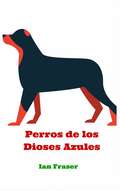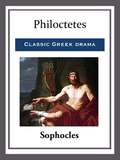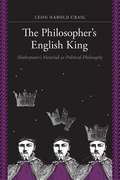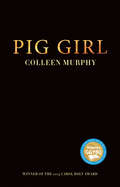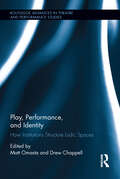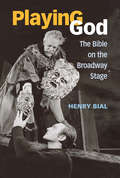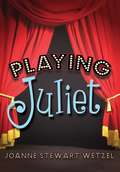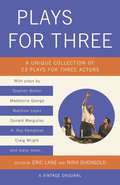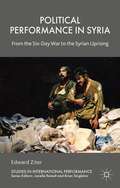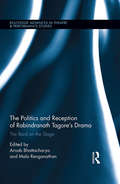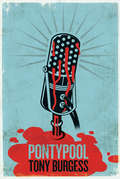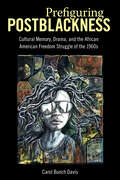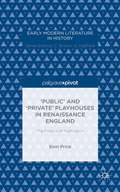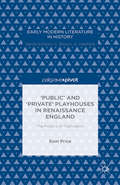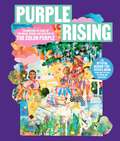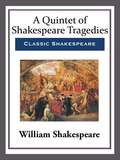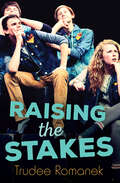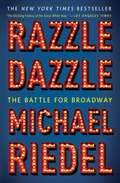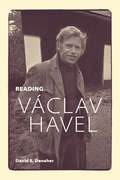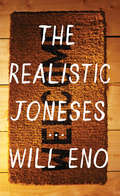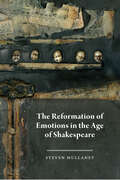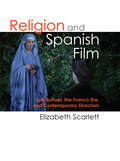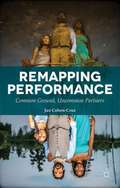- Table View
- List View
Perros de los Dioses Azules
by Ian Fraser Mara Doménech De SeingaltEsta entrañable obra de teatro, hecha tanto para jóvenes como para adultos, enseña el valor de la libertad a través de unos perros policías entrenados para atacar. Esta obra sirve de metáfora sobre la verdadera libertad, la que se elige, y aquella que viene impuesta. Una magnífica obra de teatro, ocurrente, simpática y que al mismo tiempo que hace reflexionar sobre la libertad, ya sea nuestra o de cualquier animal, ofrece unos momentos divertidos sin dudarlo.
Philoctetes
by SophoclesThe winner of the Festival of Dionysus in 409 BC, 'Philoctetes' describes the attempt by Neoptolemus and Odysseus to bring disabled master archer, Philoctetes, with them to Troy. The play covers several deep, contentious themes, including moral relativity, trauma, love vs. hatred, and friendship vs. enmity.
The Philosopher's English King: Shakespeare's Henriad As Political Philosophy
by Leon Harold CraigThis book on Shakespeare's Henriad studies the tetralogy as a work of political thought. Leon Harold Craig, author of two previous volumes on Shakespeare's political thought, argues that the four plays present Shakespeare's teaching on the problem of legitimacy, or who has the right to rule -- one of the perennial questions of political philosophy. Offering original interpretations of each of the plays, Craig discusses the demise of divine right in Richard II, political upheaval and disputed rule in Henry IV, Parts 1 and 2, and the attempt to reestablish legitimacy on a new basis in Henry V. While focusing especially on the plays' various interpretive puzzles, Craig shows how the four plays constitute one narrative, culminating in the rule of England's most famous warrior king, Henry V, whose brilliant achievements were undone by ill fortune. Craig concludes with an epilogue on what might have been had Henry lived to consolidate his conquest of France and unify it with England under a single crown. Supported by a wealth of scholarship, both historical and critical, The Philosopher's English King makes a major contribution to the burgeoning scholarship on Shakespeare as a political thinker, providing further evidence for why the poet deserves to be recognized as a philosopher in his own right. Leon Harold Craig is professor emeritus of political science at the University of Alberta.
Pig Girl
by Colleen MurphyAt 4:00 a.m. on a secluded farm, a woman fights to take her life back from a serial killer as her desperate sister and a haunted police officer reach across time and distance in an attempt to rescue her.
The Pilgrim's Progress
by John BunyanThis book, the most perfect allegory ever produced, has been more widely read in English than any other book except the Bible. The English of the book is pure and strong; but its great power lies neither in its English nor in the perfection of the allegory, but in the fact that in picturing his own religious struggles, Bunyan pictured those of other men as well. Stylistically, Bunyan combines simplicity with rare earnestness. He had something to say, and in his in most soul he felt that this something was of supreme importance for all time. He also had a rare combination of imagination and dramatic power. His abstractions became living persons. It would be difficult to find English prose that is more simple, earnest, strong, imaginative, and dramatic than this work. Bunyan's style felt the shaping influence of the Bible more than of all other works combined. He knew the Scriptures almost by heart. It is no wonder that in the allegories of the world's literature, The Pilgrim's Progress stands out as a masterpiece written to people of every age and condition.
Play, Performance, and Identity: How Institutions Structure Ludic Spaces (Routledge Advances in Theatre & Performance Studies)
by Matt Omasta Drew ChappellPlay helps define who we are as human beings. However, many of the leisurely/ludic activities people participate in are created and governed by corporate entities with social, political, and business agendas. As such, it is critical that scholars understand and explicate the ideological underpinnings of played-through experiences and how they affect the player/performers who engage in them. This book explores how people play and why their play matters, with a particular interest in how ludic experiences are often constructed and controlled by the interests of institutions, including corporations, non-profit organizations, government agencies, religious organizations, and non-governmental organizations (NGOs). Each chapter explores diverse sites of play. From theme parks to comic conventions to massively-multiplayer online games, they probe what roles the designers of these experiences construct for players, and how such play might affect participants' identities and ideologies. Scholars of performance studies, leisure studies, media studies and sociology will find this book an essential reference when studying facets of play.
Playing God: The Bible On The Broadway Stage
by Henry Carl BialWhether we regard it as the collected inscriptions of an earlier oral tradition or as the divinely authored source text of liturgical ritual, the Bible can be understood as a sacred performance text, a framework for an instructional theater that performs the shared moral and ethical values of a community. It's not surprising, then, that playwrights have turned to the Bible as a source for theatrical adaptation. Biblical texts have inspired more than 100 Broadway plays and musicals, ranging from early spectacles like Ben-Hur (1899) to more familiar works such as Godspell and Jesus Christ Superstar. What happens when a culture's most sacred text enters its most commercial performance venue? Playing God focuses on eleven financially and/or critically successful productions, as well as a few notable Broadway flops that highlight the difficulties in adapting the Old and New Testaments for the stage. The book is informed by both performance studies and theater history, combining analysis of play-scripts with archival research into the actual circumstances of production and reception. Biblical plays, Henry Bial argues, balance religious and commercial considerations through a complex blend of spectacle, authenticity, sincerity, and irony. Though there is no magic formula for a successful adaptation, these four analytical lenses help explain why some biblical plays thrive while others have not.
Playing Juliet
by Joanne Stewart WetzelBeth Sondquist, age twelve and a half, dreams of playing the part of Juliet. For now she’s just the cat in Cinderella, but one day, she’s determined to become a real actress. But all her hopes for an acting career come crashing down when the Oakfield Children’s Theater is slated to be closed. Its new owner has decided to make it into an adult theater, a real theater. Beth and her best friend, Zandy, are willing to do whatever it takes to save the theater, but their plans quickly go awry. When Beth’s father catches her sneaking back into her bedroom window well past bedtime, Beth is in big, big trouble. With eviction looming, the children’s theater director decides to close the theater with the same play the theater opened with fifty years ago--Romeo and Juliet. But Beth’s grounded for the next two weeks, and she won’t be able to try out. How will Beth pull off playing Juliet if she can’t even make tryouts? Playing Juliet is funny and honest and celebrates bravery and doing the right thing even when it gets you into trouble. It’s about having the courage to go after what you want and making your dreams come true. It’s also about friendship and family. As an almost-thirteen-year-old, Beth has a unique bond with thirteen-year-old Juliet, and she eventually recognizes just how silly and immature Juliet’s decisions are. Only Beth can play Juliet as the kid that she is. With a little bit of luck, maybe she’ll get her chance.
Plays for Three
by Nina Shengold Eric LanePLAYS FOR THREE is a unique anthology of 23 outstanding plays for three actors by an exciting mix of established and emerging playwrights. Everyone's heard that "Two's company, three's a crowd." That may be true on a date, but on stage, three is a magic number. Add a third character to any interaction and the dramatic possibilities increase exponentially: suddenly there's competition, intrigue, shifting allegiances, comic misunderstandings, secrets and lies. Triangles make excellent drama, and three-handers offer the kind of substantial and challenging roles that actors love. Plays for Three offers six full-length and seventeen short plays featuring dramatic trios of every sort. Rob AckermanPete BarryStephen BelberCesi DavidsonAdrienne DawesPhilip DawkinsCatherine FillouxMadeleine GeorgeAmlin GrayFrank HigginsCory HinkleWendy KesselmanEric LaneKitt LavoieMark Harvey LevineMatthew LopezDonald MarguliesAnna MoenchA. Rey PamatmatDavid Riedy Nina ShengoldStephen WebbCraig WrightFrom the Trade Paperback edition.
Political Performance in Syria
by Edward ZiterPolitical Performance in Syria, charts the history of a theatre that has sought the expansion of civil society and imagined alternate political realities. In doing so, the manuscript situates the current use of performance and theatre by artists of the Syrian Revolution within a long history of political contestation.
The Politics and Reception of Rabindranath Tagore's Drama: The Bard on the Stage (Routledge Advances in Theatre & Performance Studies)
by Arnab Bhattacharya Mala RenganathanThis is the first volume to focus specifically on Rabindranath Tagore’s dramatic literature, visiting translations and adaptations of Tagore’s drama, and cross-cultural encounters in his works. As Asia’s first Nobel Laureate, Tagore’s highly original plays occupy a central position in the Indian theatrescape. Tagore experimented with dance, music, dance drama, and plays, exploring concepts of environment, education, gender and women, postcolonial encounters, romantic idealism, and universality. Tagore’s drama plays a generous host to experimentations with new performance modes, like the writing and staging of an all-women play on stage for the first time, or the use of cross-cultural styles such as Manipuri dance, Thai craft in stage design, or the Baul singing styles. This book is an exciting re-exploration of Tagore’s plays, visiting issues such as his contribution to Indian drama, drama and environment, feminist readings, postcolonial engagements, cross-cultural encounters, drama as performance, translational and adaptation modes, the non-translated or the non-translatable Tagore drama, Tagore drama in the 21st century, and Indian film. The volume serves as a wide-ranging and up-to-date resource on the criticism of Tagore drama, and will appeal to a range of Theatre and Performance scholars as well as those interested in Indian theatre, literature, and film.
Pollution and Crisis in Greek Tragedy
by Fabian MeinelPollution is ubiquitous in Greek tragedy: matricidal Orestes seeks purification at Apollo's shrine in Delphi; carrion from Polyneices' unburied corpse fills the altars of Thebes; delirious Phaedra suffers from a 'pollution of the mind'. This book undertakes the first detailed analysis of the important role which pollution and its counterparts - purity and purification - play in tragedy. It argues that pollution is central in the negotiation of tragic crises, fulfilling a diverse array of functions by virtue of its qualities and associations, from making sense of adversity to configuring civic identity in the encounter of self and other. While primarily a literary study providing close readings of several key plays, the book also provides important new perspectives on pollution. It will appeal to a broad range of scholars and students not only in classics and literary studies, but also in the study of religions and anthropology.
Pontypool
by Tony BurgessIn the sleepy town of Pontypool, Ontario, no one is safe from an epidemic so devastating it will leave you literally speechless.
Prefiguring Postblackness: Cultural Memory, Drama, and the African American Freedom Struggle of the 1960s
by Carol Bunch DavisPrefiguring Postblackness explores the tensions between cultural memory of the African American freedom struggle and representations of African American identity staged in five plays between 1959 and 1969 during the civil rights era. Through close readings of the plays, their popular and African American print media reviews, and the cultural context in which they were produced, Carol Bunch Davis shows how these representations complicate narrow ideas of blackness, which often limit the freedom struggle era to Martin Luther King's nonviolent protest and cast Malcolm X's black nationalism as undermining the civil rights movement's advances.These five plays strategically revise the rhetoric, representations, ideologies, and iconography of the African American freedom struggle, subverting its dominant narrative. This revision critiques racial uplift ideology's tenets of civic and moral virtue as a condition of African American full citizenship. The dramas also reimagine the Black Arts movement's restrictive notions of black authenticity as a condition of racial identity, and their staged representations construct a counter-narrative to cultural memory of the freedom struggle during that very era. In their use of a "postblack ethos" to enact African American subjectivity, the plays envision black identity beyond the quest for freedom, anticipating what blackness might look like when it moves beyond the struggle.The plays under discussion range from the canonical (Lorraine Hansberry's A Raisin in the Sun and Amiri Baraka's Dutchman) to celebrated, yet understudied works (Alice Childress's Wine in the Wilderness, Howard Sackler's The Great White Hope, and Charles Gordone's No Place to Be Somebody). Finally, Davis discusses recent revivals, showing how these 1960s plays shape dimensions of modern drama well beyond the decade of their creation.
‘Public’ and ‘Private’ Playhouses in Renaissance England: The Politics of Publication (Early Modern Literature in History)
by Eoin Price‘Public’ and ‘Private’ Playhouses in Renaissance England.
‘Public’ and ‘Private’ Playhouses in Renaissance England: The Politics of Publication (Early Modern Literature in History)
by Eoin PriceAt the start of the seventeenth century a distinction emerged between 'public', outdoor, amphitheatre playhouses and 'private', indoor, hall venues. This book is the first sustained attempt to ask: why? Theatre historians have long acknowledged these terms, but have failed to attest to their variety and complexity. Assessing a range of evidence, from the start of the Elizabethan period to the beginning of the Restoration, the book overturns received scholarly wisdom to reach new insights into the politics of theatre culture and playbook publication. Standard accounts of the 'public' and 'private' theatres have either ignored the terms, or offered insubstantial explanations for their use. This book opens up the rich range of meanings made available by these vitally important terms and offers a fresh perspective on the way dramatists, theatre owners, booksellers, and legislators, conceived the playhouses of Renaissance London.
Purple Rising: Celebrating 40 Years of the Magic, Power, and Artistry of The Color Purple
by Lise Funderburg Scott SandersOne of Oprah&’s Favorite Things of 2023 Celebrate the 40th anniversary of the Pulitzer Prize–winning masterpiece The Color Purple—as well as the acclaimed 1985 film from Steven Spielberg, the Tony-winning Broadway musical, and the all-new film adaptation with this gorgeously designed exploration of the novel&’s enduring legacy, featuring contributions from Alice Walker, Oprah Winfrey, Steven Spielberg, Colman Domingo, Fantasia Barrino, Danny Glover, and more. Since its publication in 1982, The Color Purple has resonated with generations of readers across the globe. The novel catapulted author Alice Walker to international fame, brought Oprah Winfrey and Whoopi Goldberg acting acclaim in the 1985 film adaptation, and inspired theatrical productions around the world, including the Tony Award–winning Broadway musical. This cultural touchstone—which so profoundly touches on race, family, survival, spirituality, sisterhood, and love in all forms—continues to beget new iterations, most recently a feature film. Now, an in-depth exploration celebrates The Color Purple&’s ever-expanding legacy as never before: Purple Rising features oral histories and fresh anecdotes based on more than fifty original interviews, as well as vibrant, never-before-seen images. It reveals the crucial real-life experiences that inspired the novel, and the transcendent humanity of its themes that continue to connect with audiences, each new adaptation speaking to the changing times and cultural contexts. Creators, actors, producers, activists, cultural critics, and well-known fans comment on the power of Walker&’s story and how it has affected their lives and artistic choices, including Whoopi Goldberg, Taraji P. Henson, Danielle Brooks, Halle Bailey, Blitz Bazawule, Jon Batiste, H.E.R., Salamishah Tillet, Ricky Dillard, Gabrielle Union, and many more. An insightful and vivid celebration of an enduring classic, Purple Rising is the ultimate gift for fans of all ages and a true celebration of Black joy, storytelling, and achievement.
A Quintet of Shakespeare Tragedies
by William ShakespeareMurder, Mayhem, and Madness-- Collected here are five of William Shakespeare's greatest tragedies Romeo and Juliet, Hamlet, Macbeth, Othello, and King Lear. These are the plays that made Shakespeare's reputation. Murder, deceit, treachery, and madness play out on the grand stage. Stories for the ages! Tomorrow, and tomorrow, and tomorrow Creeps in this petty pace from day to day To the last syllable of recorded time; And all our yesterdays have lighted fools The way to dusty death. Out, out, brief candle! Life's but a walking shadow, a poor player That struts and frets his hour upon the stage And then is heard no more. It is a tale Told by an idiot, full of sound and fury, Signifying nothing.
Raising the Stakes (Orca Limelights)
by Trudee TomanekIt's the start of a new season for Harrington High's improv team--and Chloe is determined that this will be the year they make it all the way to the top. Her teammates (who also happen to be her closest friends) are a talented bunch, and she knows they can do it. They have to. Because getting to nationals is Chloe's best chance to prove--to her parents, to the improv scouts and, most of all, to herself--that she has what it takes to succeed. Chloe is doing everything she can to help her teammates perform better. So why are they all mad at her?
Razzle Dazzle: The Battle for Broadway
by Michael Riedel&“A vivid page-turner&” (NPR) detailing the rise, fall, and redemption of Broadway—its stars, its biggest shows, its producers, and all the drama, intrigue, and power plays that happened behind the scenes.&“A rich, lovely, debut history of New York theater in the 1970s and eighties&” (Kirkus Reviews, starred review), Razzle Dazzle is a narrative account of the people and the money and the power that turned New York&’s gritty back alleys and sex-shops into the glitzy, dazzling Great White Way.In the mid-1970s Times Square was the seedy symbol of New York&’s economic decline. Its once shining star, the renowned Shubert Organization, was losing theaters to make way for parking lots and losing money. Bernard Jacobs and Jerry Schoenfeld, two ambitious board members, saw the crumbling company was ripe for takeover and staged a coup and staved off corporate intrigue, personal betrayals and criminal investigations. Once Jacobs and Schoenfeld solidified their power, they turned a collapsed theater-owning holding company into one of the most successful entertainment empires in the world, spearheading the revitalization of Broadway and the renewal of Times Square.&“For those interested in the business behind the greasepaint, at a riveting time in Broadway&’s and New York&’s history, this is the ticket&” (USA TODAY). Michael Riedel tells the stories of the Shubert Organization and the shows that re-built a city in grand style—including Cats, A Chorus Line, and Mamma Mia!—revealing the backstage drama that often rivaled what transpired onstage, exposing bitter rivalries, unlikely alliances, and inside gossip. &“The trouble with Razzle Dazzle is…you can&’t put the damn thing down&” (Huffington Post).
Reading Václav Havel
by David S. DanaherAs a playwright, a dissident, and a politician, Václav Havel was one of the most important intellectual figures of the late twentieth century. Working in an extraordinary range of genres - poetry, plays, public letters, philosophical essays, and political speeches - he left behind a range of texts so diverse that scholars have had difficulty grappling with his oeuvre as a whole.In Reading Václav Havel, David S. Danaher approaches Havel's remarkable body of work holistically, focusing on the language, images, and ideas which appear and reappear in the many genres in which Havel wrote. Carefully reading the original Czech texts alongside their English versions, he exposes what in Havel's thought has been lost in translation. A passionate argument for Havel's continuing relevance, Reading Václav Havel is the first book to capture the fundamental unity of his vast literary legacy.
The Realistic Joneses
by Will Eno"[A] tender, funny, terrific new play. . . . Mr. Eno's voice, which teases out the poetry in the pedestrian and finds glinting humor in the static that infuses our faltering efforts to communicate, is as distinctive as any American playwright's today."--The New York Times"Weird and wonderful . . . Eno's familiar sudden-shifting between profound and playful verbiage is delightfully disarming and sometimes awfully funny."--Variety"Plays as funny and moving, as wonderful and weird as The Realistic Joneses... do not appear often on Broadway. Or ever, really.... Mr. Eno's voice may be the most singular of his generation, but it's humane, literate and slyly hilarious.... For all the sadness woven into its fabric, The Realistic Joneses brought me a pleasurable rush virtually unmatched by anything I've seen this season." - The New York Times"As usual, Eno's dialogue is a marvel of compression and tonal control, trivial chitchat flipping into cosmic profundity with striking ease.... There's much to savor: the dry but meaningful banter, the joy of humans sharing time and space, battling the darkness with a joke or silence. Life in Enoland isn't what you'd call realistic--it's more real than that." - Time Out New York "[An] elliptical, funny, dark and strangely moving new play.... Eno is a writer with heart and compassion." - Chicago Tribune"Eno's first-ever commercial foray ups the creative ante in a Broadway climate that can be resistant to new voices.... [A] very fine play where laughter exists a heartbeat, or heartbreak, away from tears." - The TelegraphMeet Bob and Jennifer and their new neighbors John and Pony, two suburban couples who have more in common than their identical last names. Boasting the playwright's quintessential existential quirkiness, this new comedy finds poetry in the banal while humorously exploring our ever-floundering efforts at communication. Listed as one of New York Times's Best Plays of 2012, The Realistic Joneses received its Broadway premiere in spring 2014, starring Toni Collete, Michael C. Hall, Tracy Letts and Marisa Tomei, and opening to rave reviews.Will Eno is the author of Thom Pain (based on nothing), which ran for a year Off-Broadway and was a 2005 Pulitzer Prize finalist. Other works include Middletown, The Flu Season, Tragedy: a tragedy, Intermission, and Gnit, an adaptation of Henrik Ibsen's Peer Gynt. His many awards include the PEN/Laura Pels International Foundation for Theatre Award, the Horton Foote Prize, and the first-ever Marian Seldes/Garson Kanin Fellowship by the Theater Hall of Fame.
The Reformation of Emotions in the Age of Shakespeare
by Steven MullaneyThe crises of faith that fractured Reformation Europe also caused crises of individual and collective identity. Structures of feeling as well as structures of belief were transformed; there was a reformation of social emotions as well as a Reformation of faith. As Steven Mullaney shows in The Reformation of Emotions in the Age of Shakespeare, Elizabethan popular drama played a significant role in confronting the uncertainties and unresolved traumas of Elizabethan Protestant England. Shakespeare and his contemporaries--audiences as well as playwrights--reshaped popular drama into a new form of embodied social, critical, and affective thought. Examining a variety of works, from revenge plays to Shakespeare's first history tetralogy and beyond, Mullaney explores how post-Reformation drama not only exposed these faultlines of society on stage but also provoked playgoers in the audience to acknowledge their shared differences. He demonstrates that our most lasting works of culture remain powerful largely because of their deep roots in the emotional landscape of their times.
Religion and Spanish Film: Luis Buñuel, the Franco Era, and Contemporary Directors
by Elizabeth ScarlettTreatments of religion found in Spanish cinema range from the pious to the anticlerical and atheistic, and every position in between. In a nation with a strong Catholic tradition, resistance to and rebellion against religious norms go back almost as far as the notion of "Sacred Spain." Religion and Spanish Film provides a sustained study of the religious film genre in Spain practiced by mainstream Francoist film makers, the evolving iconoclasm, parody, and reinvention of the Catholic by internationally renowned Surrealist Luis Buñuel, and the ongoing battle of the secular versus the religious manifested in critically and popularly acclaimed directors Pedro Almodóvar, Julio Medem, Alejandro Amenábar, and many others. The conflicted Catholicism that emerges from examining religious themes in Spanish film history shows no sign of ending, as unresolved issues from the Civil War and Franco dictatorship, as well as the unsettled relationship between Church and State, continue into the present.
Remapping Performance: Common Ground, Uncommon Partners
by Jan Cohen-CruzCompleting a trilogy of works by Jan Cohen-Cruz, Remapping Performance focuses on the work of artists and experts who collaborate across fields to address social issues. The book explores work of a range of artists who employ artistic training, methodologies and mind-sets in their work with experts from other sectors such as medicine and healthcare and from other disciplines, to draw an expanded map of performance platforms including university/ community partnerships, neighbourhood-bases, and cultural diplomacy. Case studies include ArtSpot Productions/Mondo Bizarro's Cry You One about climate change in southern Louisiana, incorporating theatrics and organizing; Michael Rohd/Sojourn Theatre's social and civic practices; Anne Basting's University of Wisconsin-Milwaukee-based integration of performance and creative aging; and the collaborative cultural diplomacy experiment, smARTpower. Short companion pieces add expertise from Helen Nicholson, Todd London, Julie Thompson Klein, Nancy Cantor, Maria Rosario Jackson, and Penny Von Eschen. Jan Cohen-Cruz ends with suggestions for fully integrating performance in cross-sector initiatives. This latest book by a leading figure in engaged/ applied theatre and performance builds on its predecessors by offering a future-oriented perspective, a vision of art and performance interacting with a range of social sectors and with an emphasis on HE in such partnerships, and will be a 'must-read' for all students and scholars working in this field.
